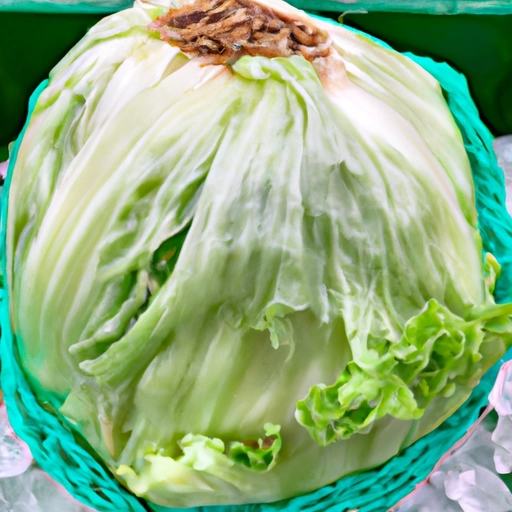Iceberg Lettuce
Description

Iceberg lettuce, known for its crisp texture and mild flavor, is a popular type of salad green. It forms a characteristic round head of densely packed, pale green leaves with a slightly white hue on the inner layers, resembling cabbage in appearance. Iceberg lettuce is a staple in kitchens across the world, valued for its refreshing crunch and versatility in various culinary applications.
Common uses
Iceberg lettuce is commonly used as a base for salads, a crunchy addition to sandwiches and burgers, and a fresh wrap for tacos and other finger foods. It's also a popular choice for garnishing and enhancing the presentation of various dishes due to its sculptural leaves.
Nutritional value
Calories
Approximately 10-15 kcal (kilo-calories) per 100 grams or about 4-6 kcal per cup (1.5-2 oz or 42.5-57 grams).
Protein
About 0.9 grams per 100 grams or approximately 0.4 grams per cup (42.5-57 grams).
Fat
Negligible amounts of fat, generally less than 0.1 grams per 100 grams or per cup.
Carbohydrates
Approximately 2-3 grams per 100 grams or about 1 gram per cup (42.5-57 grams).
Vitamins
Contains vitamin A, vitamin K, and small amounts of vitamin C and B vitamins.
Minerals
Offers minerals such as potassium, calcium, and iron, though in modest amounts.
Health benefits
Iceberg lettuce is low in calories, making it a wise choice for weight management. The fiber content aids in digestion, while the presence of vitamins and minerals like potassium support overall health. Vitamin K is essential for bone health and blood clotting, and vitamin A is important for vision and the immune system.
Potential risks
For individuals with certain health conditions, such as Vitamin K sensitivities or those on anticoagulant medications, the consumption of iceberg lettuce should be moderated. Additionally, as with any fresh produce, there is a risk of contamination with bacteria, so it should be washed thoroughly before consumption.
Common recipes
Iceberg lettuce is famously used in the classic wedge salad, Caesar salad, and as a base for many garden salads. It can also be found in wraps, spring rolls, and various sandwiches.
Cooking methods
Typically consumed raw to maintain its crunchy texture, iceberg lettuce can also be briefly grilled or sautéed for a warm salad or garnish.
Pairing with other ingredients
It pairs well with a variety of dressings, from creamy blue cheese to light vinaigrettes, and complements ingredients like tomatoes, cucumbers, onions, and avocados.
Summary
Iceberg lettuce is a crisp, refreshing, and versatile leafy green that adds texture and volume to a myriad of dishes. With its low calorie count and nutritional benefits, it's a valuable addition to a balanced diet. Its easy handling and mild taste make it a favorite in kitchens around the world.